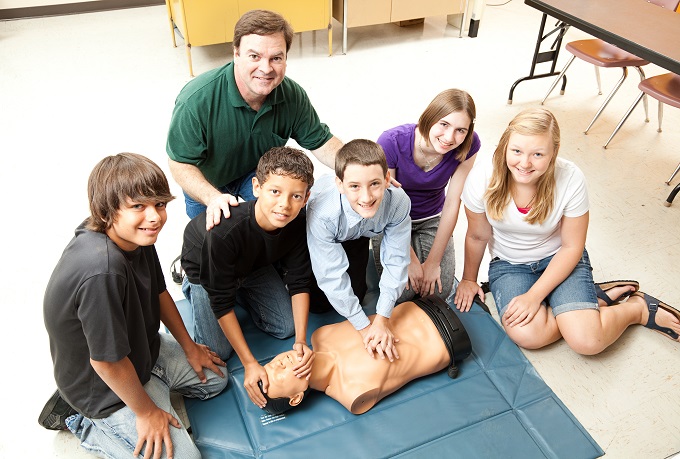
A group of teenage students learning CPR life saving techniques in class.
<h2>The UK has moved towards integrating CPR training into its national curriculum. By 2020, basic first aid will be compulsory in state-funded British schools. Should New Zealand be moving in the same direction?</h2>
<p>Approximately 12% of all out-of-hospital cardiac arrest victims in New Zealand survive following emergency CPR. Teaching children to handle a health crisis with basic first aid could also help increase awareness of common signs and symptoms of a cardiac event or stroke. </p>
<p>The New Zealand Resuscitation Council urges the NZ government to rise to the standard <a href="https://www.theguardian.com/society/2019/jan/03/children-england-taught-cpr-schools-government-plans" target="_blank" rel="noopener">recently set</a> by English schools, and teach children first aid and CPR as a core part of the health and physical education curriculum.</p>
<blockquote>
<p>“If the English can do it, so can we,” says Kevin Nation, Chief Executive of the NZ Resuscitation Council.</p>
</blockquote>
<p>“Resuscitation techniques sometimes seem more daunting to attempt than they really are, so it’s fantastic to see children being taught these invaluable skills.”</p>
<p>The NZ Resuscitation Council believes a generation of children confident in their ability to save lives can have a tremendous impact. We will all benefit from a safer, more productive society with reduced healthcare costs.</p>
<p>Two hours teaching annually, beginning at 12 years old, is enough to reach not only the children themselves but their wider communities.</p>
<blockquote>
<p>“Kids come home buzzing to share what they learn, and it could be their siblings or parents who then go on to save a life,” says Mr Nation.</p>
</blockquote>
<p>“This is an internationally established, common sense policy, and with the government already reviewing our educational curriculum we believe this is the perfect time to discuss teaching CPR in every school”.</p>

NZCER found generative AI tools are frequently used to support teaching and learning in primary…
The Ministry decision to discontinue a reading resource over kupu Māori has angered the sector…
NCEA was designed to broaden educational success, explains David Pomeroy from the University of Canterbury.
More than just a break from the classroom, a visit to a zoo or wildlife…
Without proper maintenance and care, trees can become a hazard. Are your trees in need…
Loneliness and social disconnection negatively impact wellbeing. A new WHO report finds teens feel the…
This website uses cookies.